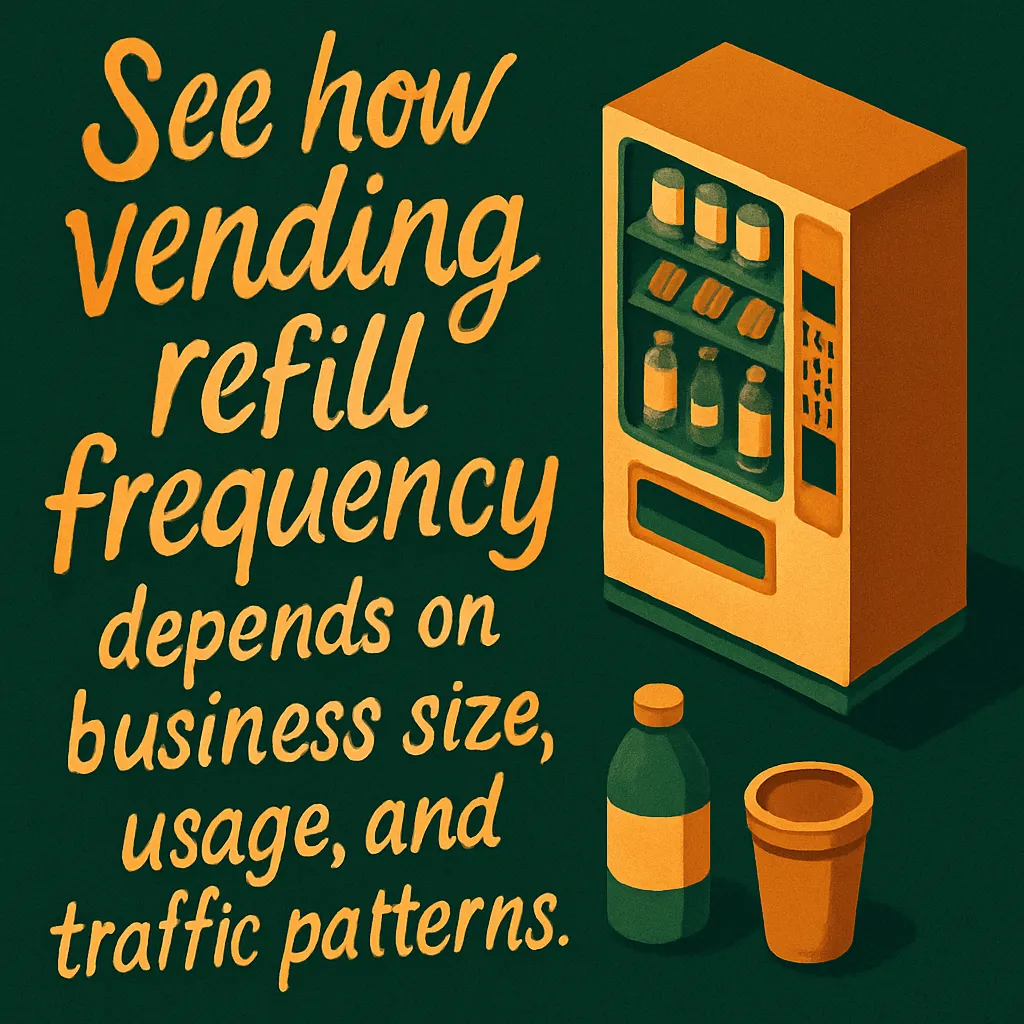How Often Are Vending Machines Refilled?
See how vending refill frequency depends on business size, usage, and traffic patterns.
Back to Vending FAQs ResourcesSee how vending refill frequency depends on business size, usage, and traffic patterns.
Back to Vending FAQs ResourcesThe frequency of vending machine refills is a dynamic process, tailored to ensure optimal product availability and customer satisfaction while streamlining operational efficiency.
![]() High-traffic locations require more frequent restocking
High-traffic locations require more frequent restocking
![]() Real-time inventory data influences refill schedules
Real-time inventory data influences refill schedules
![]() Product perishability dictates freshness checks and refills
Product perishability dictates freshness checks and refills

The question of "how often are vending machines refilled?" doesn't have a single, straightforward answer, as it depends heavily on several interconnected factors specific to each location. For any business considering a vending solution, understanding these dynamics is crucial for ensuring machines are always stocked with desired products and operating at peak efficiency. Maximizing sales and customer satisfaction relies directly on a well-managed refill strategy.
The primary determinants of vending machine refill frequency include the volume of daily transactions, the capacity of the machine itself, and the type of products being sold. A busy office with hundreds of employees might see its machines refilled multiple times a week, possibly even daily for fast-moving items, whereas a smaller business with less foot traffic may only require weekly or bi-weekly service. High-capacity machines can naturally go longer between refills than smaller units, and products like fresh food or dairy, which have shorter shelf lives, necessitate more frequent checks and restocking to ensure freshness and prevent spoilage.
Modern vending technology has revolutionized refill scheduling. Many newer machines are equipped with telemetry systems that can track inventory levels in real-time and even report sales data remotely. This allows vending providers to move away from fixed schedules and adopt a demand-driven approach. By analyzing this data, operators can strategically plan their routes, dispatching service technicians only when a machine genuinely needs attention, thus optimizing efficiency and minimizing travel costs. This advanced monitoring helps in avoiding both understocked machines and unnecessary service trips. For insights into smart vending, consider: What Is an AI Vending Cooler?
Effective management of vending machine refills often involves close coordination between the business hosting the machine and the vending service provider. Clear communication about peak usage times, popular products, and any changes in foot traffic can help tailor the refill schedule to best suit the location's needs. For businesses, this means consistent access to desired items, leading to higher employee or customer satisfaction. This proactive approach ensures that the vending machine remains a convenient and reliable amenity, contributing positively to the overall environment of the establishment. Learn more about machine requirements: Vending Machine Size and Space Requirements.
Timely refills are paramount for several reasons. Firstly, they prevent empty slots, which can frustrate customers and lead to lost sales. Secondly, they ensure a fresh selection of products, particularly important for food items, thereby maintaining hygiene standards and product quality. Lastly, consistent servicing often includes routine maintenance, allowing technicians to address minor issues before they escalate, improving machine uptime and longevity. Understanding who handles these tasks can simplify vending management: Who Fills and Restocks Vending Machines? From small companies to large venues, a well-executed refill strategy is a cornerstone of a successful vending program.
Refill frequency is primarily determined by location traffic, sales volume, machine capacity, and the types of products offered.
Locations with high foot traffic, like busy offices or public venues, will require more frequent refills, sometimes daily or every other day, due to higher sales.
Yes, high-demand items such as popular energy drinks, fresh food, or specific snack brands tend to sell out quicker and necessitate more urgent restocking.
While there's no single standard, many machines are refilled weekly or bi-weekly. Highly active locations might see service several times a week, while less active ones could be monthly.
Modern vending machines with telemetry can monitor inventory levels remotely, allowing providers to optimize refill routes and schedules based on real-time sales data rather than fixed intervals.
Infrequent refills can lead to empty slots, reduced sales, customer dissatisfaction, and a perception of poor service, potentially impacting the success of the vending program.
Yes, businesses can typically discuss and define a preferred refill schedule with their vending provider. Customization depends on the location's needs and the provider's capabilities.
Operators use historical sales data, real-time inventory monitoring, and geographical proximity to plan efficient routes that maximize product availability while minimizing operational costs.
Absolutely. Fresh food machines often require more frequent servicing (often daily or every other day) due to product perishability, compared to snack or drink machines with longer shelf lives.
Refill visits are often combined with routine maintenance checks, ensuring machines are not only stocked but also clean, fully functional, and addressing minor issues before they become major problems.